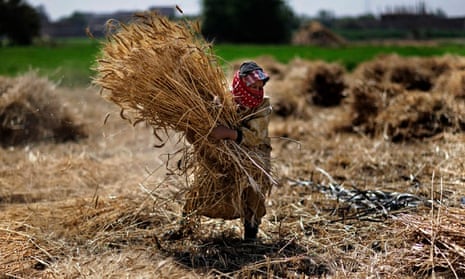The world’s existing cropland could feed at least 3 billion extra people if it were used more efficiently, a new study has found, showing that the large increases in population expected in the next three decades need not result in widespread hunger.
More than half of the fertiliser currently poured on to crops in many countries is wasted, according to the study. About 60% of the nitrogen applied to crops worldwide is not needed, as well as about half of the phosphorus, an element whose readily available sources are dwindling.
Cutting waste even by modest amounts would also feed millions, the authors found: between one-third and a half of the viable crops and food produced from them around the world are wasted, in the developing world usually because of a lack of infrastructure such as refrigerated transport, and in the rich world because of wasteful habits.
The study, published in the peer-review journal Science and led by scientists at the University of Minnesota in the US, suggested that a focus on staple crops such as wheat and rice in key countries, including China, India, the US, Brazil, Indonesia, Pakistan and Europe, would pay off in terms of producing more food for the world’s growing population. Most forecasts are that the world will number more than 9 billion people by 2050, up from about 7 billion people today.
Looking after water could also yield vast dividends, the report found: if the water used for irrigation was pinpointed more efficiently to where it is needed, then much more could be grown, but currently much of it is sprayed uselessly over crops. Between 8% and 15% of the water currently used could be saved, the study suggested.
But the research also found that at least 4 billion people could be fed with the crops we currently devote to fattening livestock, fuelling the argument that the over-reliance on meat in the west and among the growing middle classes in the developing world is an increasing problem when it comes to feeding the world.
Paul West, of Minnesota’s Institute of the Environment, and lead author of the paper, said the research would enable funders and policymakers to focus their efforts better on areas of agriculture where it could do most good. For instance, increasing agricultural productivity in Africa, where the actual crop yields lag severely behind their potential, could produce enough to feed hundreds of millions of people.
By focusing fertiliser use where it is needed, and avoiding overuse, countries could also bring down greenhouse gas emissions markedly. Agriculture currently amounts to between one-fifth and one-third of greenhouse gases, coming from deforestation, methane and fertilisers.
West said that the report gave cause for optimism, showing that the world’s growing population could be adequately fed in the future if basic measures are taken to look after food supply. But he said that politics would play a big role in whether the world grasps these opportunities.
He said: “Sustainably feeding people today and in the future is one of humanity’s grand challenges. Agriculture is the main source of water use, greenhouse gas emissions, and habitat loss, yet we need to grow more food.”
He advocated “focusing on areas, crops and practices with the most to be gained”, as the first step for governments, companies and NGOs, with a focus on China, India, the US, Brazil, Indonesia and Pakistan.
The study also noted that preventing the waste of meat was vital, as the disposal of a single kilogram of beef was equal to the waste of 24 kilograms of wheat, in terms of the effort – water, fertiliser, greenhouse gases, cropland needed – that had gone into its production.

Comments (…)
Sign in or create your Guardian account to join the discussion